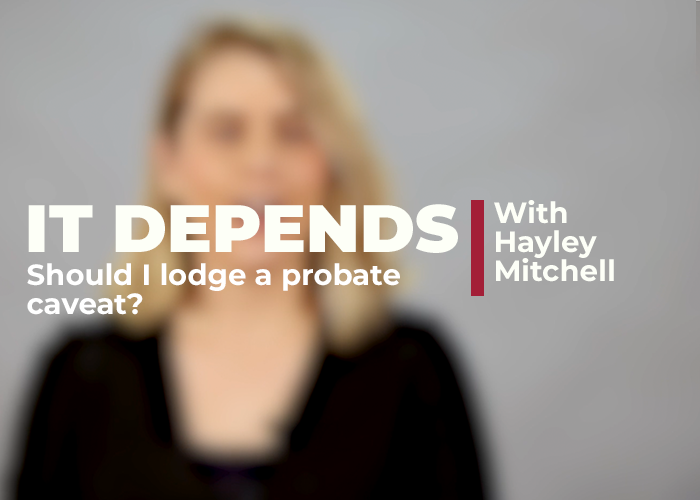In this edition of ‘It depends’, partner Hayley Mitchell talks about whether or not you should be filing a probate caveat.
VIDEO TRANSCRIPT
Hello and welcome to another edition of It Depends. Today, I’m going to be talking about whether or not you should be filing a probate caveat.
What is a probate caveat?
A probate caveat is a document filed with the Supreme Court which prevents the executor or administrator getting a grant of representation, so that is a grant probate or a grant of letters of administration. In turn, this leads or prevents the executor from dealing with the estate assets. So, essentially puts a hold until the issues can be resolved.
Why lodge a probate caveat?
You should consider lodging a probate caveat if you’ve got concerns about whether the Will is valid. So, if you’ve got concerns that there was a lack of capacity to make the Will or the Will was made under undue influence, then you should seek advice about lodging a probate caveat. If however, on the other hand, you consider that you’ve been left without adequate provision under the Will, and you wish to seek an additional amount from the estate, then a probate caveat isn’t the right document to be filing in this scenario, and you need to seek advice about a family provision application. If you’re considering a family provision application, then check out our video on that.
Who can lodge a probate caveat?
It will depend on what provision was made for you under a previous Will or if there is no previous Will at all, what you would receive under the intestacy provisions. Your interest under the earlier Will or under the intestacy provisions must be greater than what you receive in the Will that you are contesting or have an issue with. If your interest under the earlier Will is less than what you receive under the Will that you’ve got concerns about, then you are not eligible to make or to file the probate caveat. And that’s because you’re receiving more under the Will in question.
What happens after I lodge the probate caveat?
Again, this will depend. It may force the executor or the person on the other side to start formal proceedings in court for the court to determine whether or not the Will is valid, or it may be that you enter into discussions or negotiations with the other side. Either way, filing a probate caveat may have some cost implications for you. So, you should seek advice before you file the probate caveat with the court. If you’ve got questions about probate caveats or Will disputes, then contact a member of our private client team.





